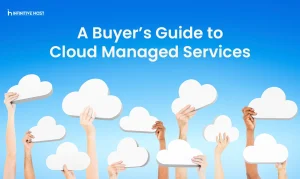Table of Contents
Cloud computing has revolutionized the way businesses manage their IT infrastructure. It has offered businesses a flexible, scalable, and cost-effective solution to manage their IT infrastructure. However, managing a cloud infrastructure can be a challenging task for businesses, especially if they lack the necessary skills and resources. This is where managed cloud services come into play. It provides businesses with the necessary support to manage their cloud infrastructure effectively. In this blog, we will discuss in detail what managed cloud services are, which companies can be categorized as managed service providers on cloud, the benefits of hiring them, and how to choose a managed service provider on cloud.
Deep Overview of Managed Cloud Service Hosting

It is a type of cloud service that provides businesses with the necessary support to manage their cloud infrastructure effectively. These providers offer a range of services, including infrastructure management, security management, database management, network management, and application management.
These services allow businesses to outsource their cloud management tasks to a third-party service provider. The service provider takes care of all the management tasks, including software updates, security patches, and system monitoring. This allows businesses to focus on their core competencies while the service provider takes care of the IT infrastructure.
The services of managed cloud are available in different deployment models, including public, private, and hybrid cloud. Public cloud services are offered by third-party providers, while private cloud services are managed in-house by the organization. Hybrid cloud services combine the benefits of both public and private clouds.
Which Companies Can Come Under the Category of Managed Cloud Service Providers?

There are many companies that provide managed cloud services to businesses. Some of the well-known companies in this space include Amazon Web Services (AWS), Microsoft Azure, Google Cloud, IBM Cloud, Rackspace, and many others.
- AWS is one of the leading providers of managed cloud services. It offers a wide range of services, including infrastructure management, security management, and application management. AWS provides businesses with the flexibility to choose from a range of services that best suit their needs.
- Microsoft Azure is another popular provider of managed cloud services. It offers a range of services, including infrastructure management, database management, and security management. Microsoft Azure provides businesses with a high level of security and compliance.
- Google Cloud is another popular provider of managed cloud services. It offers a range of services, including infrastructure management, database management, and application management. Google Cloud provides businesses with a high level of scalability and flexibility.
Benefits of Hiring a Managed Cloud Service Provider

There are many benefits of hiring a managed cloud service provider for businesses. Some of these benefits include:
- Cost-Effective: It is cost-effective compared to managing the IT infrastructure in-house. Businesses do not need to invest in hardware, software, or IT staff, which can be expensive.
- Scalability: It offers businesses the flexibility to scale their IT infrastructure as per their needs. Businesses can quickly add or remove resources as per their requirements.
- Focus on Core Competencies: It allows businesses to focus on their core competencies while the service provider takes care of the IT infrastructure. This allows businesses to be more productive and efficient.
- Security: Managed cloud companies offer a high level of security and compliance. They have the necessary expertise and resources to manage security and compliance effectively.
- Disaster Recovery: It offers disaster recovery solutions to businesses. This ensures that businesses can quickly recover from any disaster or downtime.
How to Choose a Managed Cloud Service Provider?
1. Evaluate Your Business Needs
Before you begin searching for a managed cloud service provider, evaluate your business needs. Determine what services you require, your budget, and your timeline. This will help you narrow down your options and find a provider that offers services that align with your business needs.
2. Consider Security Measures
Security is a top concern for businesses when it comes to cloud computing. Look for a managed cloud service provider that has robust security measures in place to protect your data. Ask about their security protocols, such as data encryption, access controls, and intrusion detection and prevention systems.
3. Check Service Level Agreements (SLAs)
SLAs outline the terms and conditions of the service that the provider offers. It’s essential to read and understand the SLA before signing any contract. Look for a provider that offers a comprehensive SLA that covers performance, uptime guarantees, and support services.
4. Check the Provider’s Track Record
To check the track record of managed cloud companies. Look for a provider that has experience working with businesses similar to yours. Check their customer reviews and testimonials to get an idea of their customer satisfaction levels.
5. Evaluate Their Support Services
Support services are essential when it comes to managed cloud services. Ensure that the provider offers 24/7 support and has a dedicated support team. Look for a provider that offers different support channels such as phone, email, and chat.
Conclusion
Choosing the right managed cloud service provider can be challenging, but by following the tips outlined in this buyer’s guide, you can find a provider that meets your business needs. Remember to evaluate your business needs, consider security measures, check SLAs, evaluate the provider’s track record, and evaluate their support services.
It can help your business optimize your cloud infrastructure, reduce downtime, and increase efficiency. By choosing the right provider, you can take advantage of these benefits and more.
In conclusion, take your time when selecting a managed service provider on cloud, and ensure that they offer the services you need, have a robust security system, provide a comprehensive SLA, have a good track record, and offer excellent support services. With the right provider, you can leverage the power of the cloud to help your business grow and succeed.
Related:- The Benefits Of Cloud Hosting Servers







